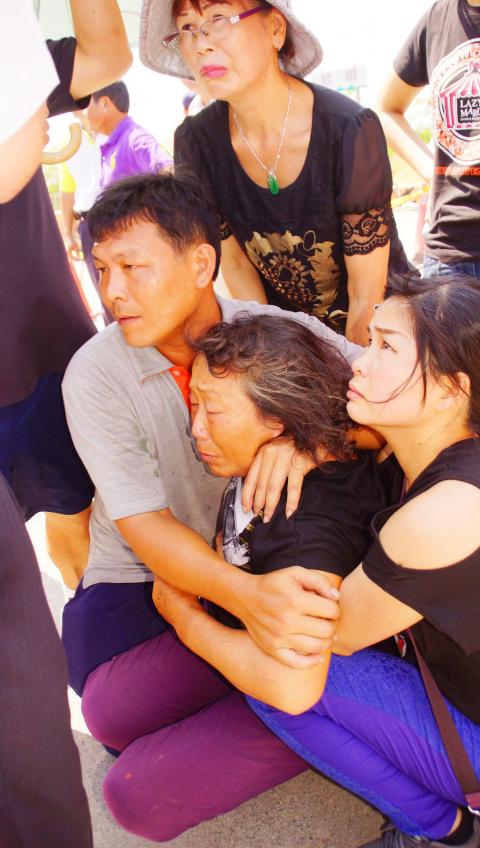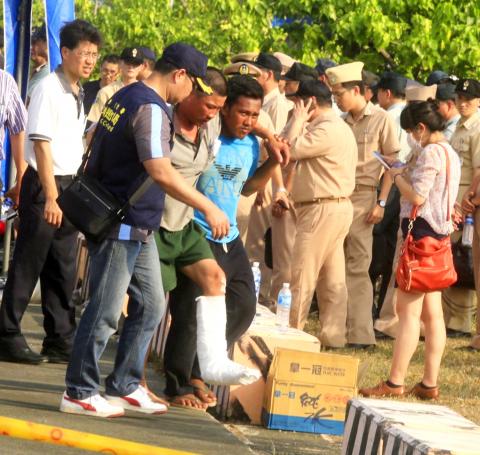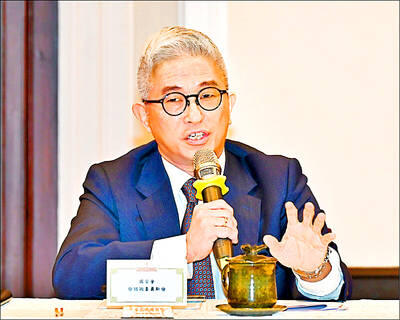Ministry of National Defense officials and Navy Command Headquarters confirmed one fatality and three persons injured aboard the Hsiang Li Sheng (翔利昇), a Taiwanese fishing boat, when the vessel was struck by a missile in waters southeast of Penghu County in the Taiwan Strait.
Fishing boat captain Huang Wen-chung (黃文忠) was killed when the supersonic Hsiung Feng III missile penetrated the stern of the vessel. The missile did not explode on impact and sank into the water about 40 nautical miles (74.1km) from its launch site at Zuoying Military Harbor in Kaohsiung.
The captain’s son, Huang Ming-chuan (黃明泉), as well as a Vietnamese crew member and a Filipino crew member, sustained minor injuries and were treated at a local hospital.

Photo: CNA
The vessel was towed back to Kaohsiung Harbor with the help of coast guard patrol ships.
The stern of the fishing boat has a hole where the missile penetrated the vessel, causing the boat’s electrical wiring box to explode.
Huang Ming-chuan said they were trawling for shrimp about 16 nautical miles west of Chimei Islet, adding that at the time of the incident, he and two crew members were sleeping while his father piloted the ship.

Photo: CNA
“We were woken by a loud explosion and I saw the ship’s ceiling collapse. I was hit by some debris and cut, then the cabin caught fire,” he said.
Huang Ming-chuan said he went to check the pilot room and found his father dead, having apparently suffered head injuries.
He said that he used a satellite telephone to call his family in Kaohsiung, saying: “The ship has exploded, and father has died. Now the ship is sinking, get help to save us quickly.”
At a news conference called by Naval Command Headquarters, officials said the missile that hit the fishing ship did not explode on impact, because it was designed to attack warships and explode on impact with a metal hull. As the Hsiang Li Sheng is made of wood, fiberglass and other lightweight materials, the missile penetrated the stern without exploding.
Naval officials said the electronic signals emitted by the fishing boat might have caused the missile’s radar guidance system to lock onto it as a target.
The Kaohsiung District Prosecutors’ Office has opened an investigation into the incident to determine if there is a case for criminal prosecution.
“The Ministry of National Defense sincerely apologizes for the incident that caused the death of the captain and injured the other crew members,” ministry spokesman Major General Chen Chung-chi (陳中吉) said, adding that the ministry has also asked the navy to provide compensation and assistance to the families of the victims.
Meanwhile, during a legislative floor session yesterday, Premier Lin Chuan (林全) expressed sadness over the death of the captain and regret over the incident.
He said he has asked his deputy to meet with the victim’s family.
Vice Premier Lin Hsi-yao (林錫耀) traveled to Kaohsiung on behalf of the premier to comfort the deceased captain’s family and express his condolences.
“First of all, I would like to offer my condolences to the Huang family on behalf of Premier Lin Chuan, and show the government cares about this accident,” he said. “The premier has asked the military to investigate how the accident occurred as soon as possible.”
“The government will shoulder 100 percent of the responsibility when the investigation is completed,” he added.
Additional reporting by Loa Iok-sin and CNA

A car bomb killed a senior Russian general in southern Moscow yesterday morning, the latest high-profile army figure to be blown up in a blast that came just hours after Russian and Ukrainian delegates held separate talks in Miami on a plan to end the war. Kyiv has not commented on the incident, but Russian investigators said they were probing whether the blast was “linked” to “Ukrainian special forces.” The attack was similar to other assassinations of generals and pro-war figures that have either been claimed, or are widely believed to have been orchestrated, by Ukraine. Russian Lieutenant General Fanil Sarvarov, 56, head

SAFETY FIRST: Double the number of police were deployed at the Taipei Marathon, while other cities released plans to bolster public event safety Authorities across Taiwan have stepped up security measures ahead of Christmas and New Year events, following a knife and smoke bomb attack in Taipei on Friday that left four people dead and 11 injured. In a bid to prevent potential copycat incidents, police deployments have been expanded for large gatherings, transport hubs, and other crowded public spaces, according to official statements from police and city authorities. Taipei Mayor Chiang Wan-an (蔣萬安) said the city has “comprehensively raised security readiness” in crowded areas, increased police deployments with armed officers, and intensified patrols during weekends and nighttime hours. For large-scale events, security checkpoints and explosives

‘POLITICAL GAME’: DPP lawmakers said the motion would not meet the legislative threshold needed, and accused the KMT and the TPP of trivializing the Constitution The Legislative Yuan yesterday approved a motion to initiate impeachment proceedings against President William Lai (賴清德), saying he had undermined Taiwan’s constitutional order and democracy. The motion was approved 61-50 by lawmakers from the main opposition Chinese Nationalist Party (KMT) and the smaller Taiwan People’s Party (TPP), who together hold a legislative majority. Under the motion, a roll call vote for impeachment would be held on May 19 next year, after various hearings are held and Lai is given the chance to defend himself. The move came after Lai on Monday last week did not promulgate an amendment passed by the legislature that

PENTAGON ASSESSMENT: A US report said that even as China and Russia deepen their partnership, cooperation is hindered by a ‘mutual distrust’ of each other The Chinese People’s Liberation Army (PLA) as of October had doubled the number of ships and airplanes deployed around Taiwan compared with the previous two years, Vice Minister of National Defense Hsu Szu-chien (徐斯儉) said yesterday, a day after the opposition-controlled legislature voted against reviewing the government’s general budget for next year, including a NT$1.25 trillion (US$39.71 billion) special defense spending bill. The legislature’s vote against the Ministry of National Defense’s spending plans was regrettable, as the budget was designed to respond to the developing Chinese military threat, Hsu said on the sidelines of a legislative meeting on the general budget. Defense